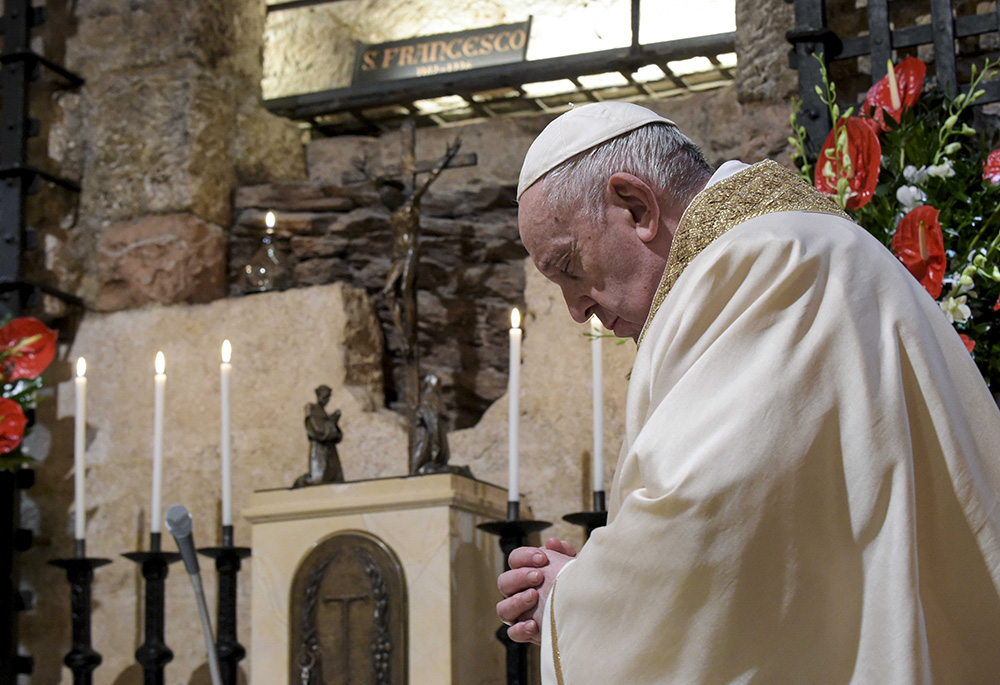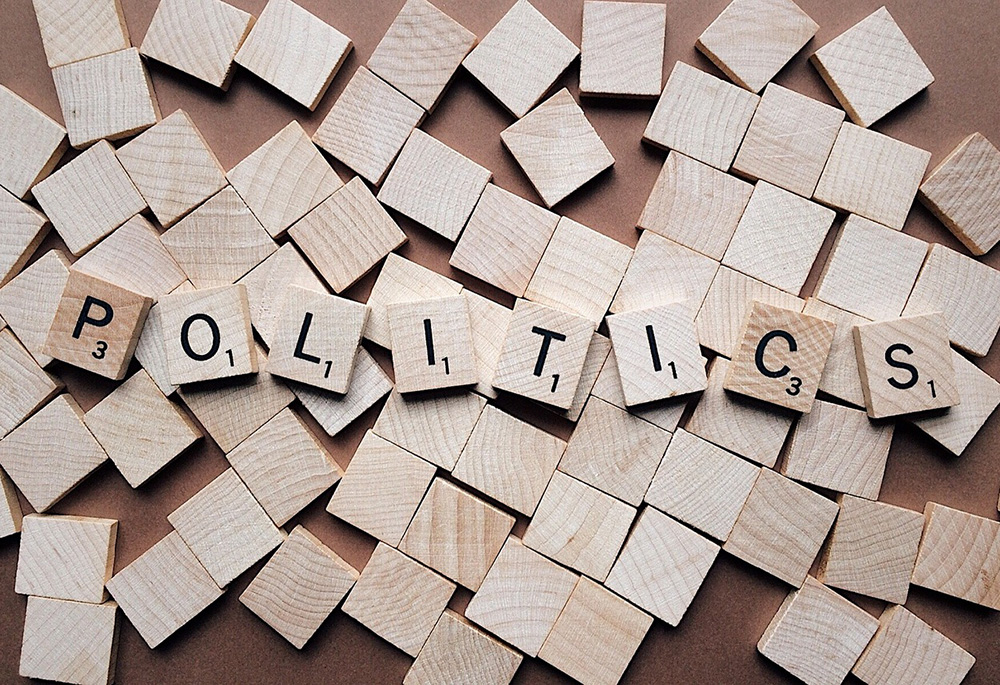
Pope Francis celebrates Mass at the tomb of St. Francis in the crypt of the Basilica of St. Francis Oct. 3, 2020, in Assisi, Italy. The pope signed his encyclical Fratelli Tutti at the end of the Mass. Francis makes "A Better Kind of Politics" the subject of an entire chapter. (CNS/Vatican Media)
I sometimes joke that, 30 years ago, I bet my life and my career on higher education, the Roman Catholic Church, and the American form of constitutional government — three unshakable, bedrock institutions. It's true, of course. It's not much of a joke. But across the last several years it has come to seem funny that I could have thought those three were a good bet.
For as much as that bit of gallows humor always gets a laugh in 2024, I mention it because it points to a deeper conviction that I have — one I have acquired across now three decades of professional engagement with the academy, the church and our politics. In a deeply important sense, they're all the same thing. And, they're all suffering for the same reasons.
I found myself thinking about that recently in my classroom at Chicago's DePaul University, where I am teaching classical political thought during this winter term. Though I am appointed as a theologian at my home institution the Catholic Theological Union, my training is in political science and, really, I am a political theorist. It's always a pleasure for me to return to teaching the writers who first discerned what politics is in an ancient world where the lines between drama, poetry, philosophy, religion, and public life were not so well drawn as they are today.
For those ancient people in the Athenian city-state that thrived between the time of Solon and Plato, politics was a rich experience. Public life was experienced in performances of poetry and drama that are early antecedents of our sense of liturgy (from the Greek leitourgia, "public work"). Audiences heard tragic stories of their gods interacting with human affairs, and the experience shaped their public life. As the classicist Edith Hamilton wrote, "The poet and the actors did not speak to the audience; they spoke for them. Their task and their power was to interpret and express the great communal emotion. … That deep community of feeling came to pass in the theatre. … [People] lost their sense of isolation." Our understanding of public life arose from these experiences.
Hamilton reminds us that we use the word "politics" far too casually today. That is a central message I try to convey whenever I teach politics. The truest meaning of the word does not convey a sense of partisanship or division, corruption or competition. It had no such meaning when politics first arose from those ancient city-states. In its first, best and most useful sense, politics means "our shared life," the life of the community. The Greek origins of our word politics (politeia) convey this sense — roughly, "what the city does together." Politics is a community discerning together, sorting through its options and weighing its advantages and disadvantages to arrive at a course of action. When conflicts arise, politics means addressing them through discussion and law rather than violence. Politics means valuing our shared life together more than we value winning any argument — and bearing witness to that value in our commitment to dialogue with one another.

(Pixabay/Wokandapix)
In this way, a university classroom also is a political space. A classroom is a community discerning together. We discuss, we grapple with problems, and through dialogue we come to understanding. The classroom exists because none of us comes to understanding alone and, because we value coming to a better understanding together, we also come to value our community of relationship. The freedom to speak our point of view and seek the truth together wherever that search leads us is that community’s distinguishing characteristic. The classroom is a place where we learn skills of citizenship no matter what we are studying there. In this way, the freedom and the relationships of the classroom are connected intimately to how we live our public life.
The church also is a political community. The meaning of ecclesia is "the community that is called together," and so the church is a community called to bear witness together to what we believe. We do this in the public work of the liturgy all the time: A visible church is joined to an invisible church, our Sunday assembly alongside the communion of the saints together joined in the same act and the same conviction of faith. But certainly Pope Francis' call to a synodal style of church also invites us to recognize the church as a political community where, all together as a community of the baptized, we discern the promptings of the Spirit in conversation with one another.
I know this is an unfamiliar way to think about politics. But often I think that returning to this way of thinking about politics holds answers for us.
In its first, best and most useful sense, politics means "our shared life," the life of the community.
In the first place, we need to recover the word "politics" from the ways that we abuse it. The word should mean something greater to us than division. Some things in our personal lives and in our public lives need to be objects of greater than usual reverence. It is for that reason that Pope Francis so consistently has pointed us toward "a better kind of politics."
That call to embrace politics for what it really is has been a distinguishing mark of Pope Francis' ministry. I always am amazed it gets so little attention. Early in his pontificate, in Evangelii Gaudium (2013), Pope Francis told us that "Politics, though often denigrated, remains a lofty vocation and one of the highest forms of charity." In "Laudato Si', on Care for Our Common Home" (2015) he insisted that “a healthy politics is sorely needed.” And in Fratelli Tutti (2020) , Francis makes "A Better Kind of Politics" the subject of an entire chapter. He tells us that "to be part of a people is to be part of a shared identity" that arises from "advancing toward a common project." The heart of arriving at this "better kind of politics" is love (caritas) "which is the spiritual heart of politics."
Advertisement
Yet our communities are suffering. Our national political community is suffering, but so is our church. So are universities. They suffer in different ways, but polarization and an absence of love are the root of all of them. Together, the suffering of those communities is a manifestation of our failure to love one another and to love the opportunities we have to recognize one another as friends in the communities we share. Pope Francis seems to be telling us that Catholics should be leaders in our communities: We should be the ones who bear witness in love to "a better kind of politics." But too often, we are the bringers of division both in the church and outside it.
Pope Francis seems to be telling us that Catholics should be leaders in our communities: We should be the ones who bear witness in love to "a better kind of politics." But too often, we are the bringers of division both in the church and outside it.
There is no simple answer to this problem, but there is a good beginning. We can heed Pope Francis in Fratelli when he imagines our communities as places "where differences coexist, complementing, enriching and reciprocally illuminating one another." We can have so much courage as to listen respectfully and still love amid disagreement. But even more basically, we can fulfill the promises of our baptism, live our faith in he who commanded us, "As I have loved you, so you should love one another" (John 13:34).
To live our faith in that way is the most political thing we can do.








